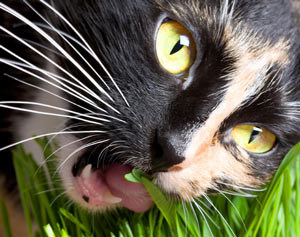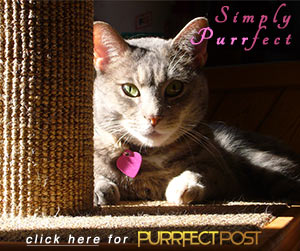Why Do Cats Eat Grass?

Cats are obligate carnivores. That means that they must eat meat to survive. Their systems are exquisitely designed to use large amounts of protein. However, if you've been around many cats with access to the outdoors, you've undoubtedly seen one munching on blades of grass. So, if their systems are designed to eat mainly meat, why do cats eat grass?
While we can't know the answer to this puzzling feline behavior question with certainty, there are several likely explanations.
Cats Eat Grass Because It's Fun
Cats are predators by nature, and attacking and chomping on a waving piece of grass may remind them of catching and munching on a bird or rodent. A young cat may practice her predatory moves on gently swaying blades of grass, and an older cat that is well-fed might just like to pretend for a moment that he's a big, bad hunter.
Cats Might Eat Grass for Attention
Cats quickly learn which behaviors will most quickly draw their humans' notice. Many people react in some way when they see their cat chewing on grass, either because they think it's cute or because they are trying to get the cat to stop so he doesn't get sick. A cat might repeat the grass-eating behavior to receive attention from his people.
Kittens Are Curious and Playful
With kittens, nothing is off limits for jumping on and tearing into. They are still learning about their environment, and lots of things go directly into their mouths. Once a kitten has chewed on a blade of grass once, he may be inclined to do so again, having discovered that it has a satisfying texture or taste.
Eating Grass Might Ease a Cat's Gastrointestinal Troubles
This is a controversial explanation, but some people believe that cats knowingly eat grass when they have an upset stomach or are a bit constipated. Grass certainly can act as a laxative in cats, and it also often causes them to vomit. Grass causes vomiting in cats because it mechanically irritates the lining of the stomach and because cats lack the digestive enzymes to break down much grass. Vomiting can help a cat with an upset stomach by bringing up any foreign items that may be causing the queasiness. In the wild, cats may eat a bit of grass to bring up the indigestible bones and fur of their prey. But whether or not cats do this on purpose is a matter of debate.
Cats Can Develop Obsessive-Compulsive Disorders
Some cats develop obsessive-compulsive disorders that may cause them to chew on and/or eat things that are not a proper food source for them. These items often include plastic, hair ties, wood, and fabric. Some cats that seem driven to eat grass may also suffer from this condition. You can learn more about it in this article about pica, or eating strange things. If your cat's grass-eating is an obsession, you will need to consult with your veterinarian or a veterinary behavior specialist.
Is Eating Grass Bad for Cats?
Eating a small amount of grass is probably not going to cause too many problems for your cat, though he is likely to vomit the grass back up. If your cat has access to the outdoors and eats grass out there, you need to be concerned about any pesticides and fertilizers that might have been applied to the meadow that your cat is munching on.
Grass-eating may also be hazardous if your cat's penchant for prairie expands to include other plants. Many plants, including countless houseplants, are toxic to cats. If your salad-loving feline's palate has widened to include other plants, here are some things you can do:
- Limit your cat's access to plants. Keep any plants that you have in your home in areas that your cat can't get to.
- Use cat deterrents on the plants in your home. These can be used on non-toxic plants in an attempt to teach your cat that eating them isn't fun. Bitter apple spray can be used on a plant's leaves to make them unappealing to your cat. Do not rely on deterrents to keep your cat from eating a toxic plant.
- Provide alternatives that are safe for your cat. You can dissuade your cat from eating your plants by providing acceptable alternatives such as potted cat grass. Many cats also love catnip, and it's fun and easy to grow some safely at home as well. Making sure that your cat has lots of interactive toys and play time with you can also help decrease his desire to create his own fun by eating grass.
You can read more about keeping your cat from chewing and eating houseplants in this article.
You May Also Like These Articles:
Pica in Cats: Why Cats Eat Strange Things
Common Plants Poisonous to Cats
Sago Palms Can Be Lethal to Cats
How To Decide On An Indoor or Outdoor Lifestyle
Dehydration in Cats: How Can You Tell If A Cat Is Dehydrated?




